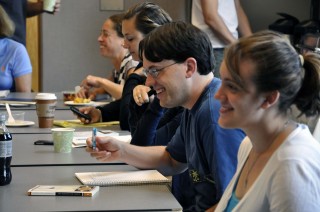The words of Shakespeare, Saint Augustine, and John Perry echoed their wisdom anew as 16 high school teachers participated in Colgate’s third annual Humanities Workshop for High School Teachers July 23–27.
Led by philosophy professors Ed Witherspoon and David McCabe, English professor Susan Cerasano, and French professor Patrick Riley, this year’s workshop centered on exploring literature with overarching ideas and motifs pertaining to “Cultivating Memory, Creating Identity.”
In selecting this year’s theme, the humanities professors chose literary works that offer a window into the creation and maintenance of the perceived human identity and the many factors that feed its maturation. Some examples included The Merchant of Venice, Maus, The Ethics of Memory, and A Dialogue on Personal Identity and Immortality.
“We thought it was a good time to explore issues like: What is our identity as human individuals? and What is the community identity of a culture or a group?” said Witherspoon, the program’s director. “We looked at works that explore how that identity is shaped and formed.”
Teachers from high schools across upstate New York joined in Colgate’s Little Hall for intensive discussion panels on the assigned reading materials and were able to gain a greater perspective into college and graduate-level teaching strategies of humanities-related course material.
Witherspoon, who led a philosophy-based annual seminar prior to the humanities workshop, said that the program aims to “provide [teachers with] intellectual nourishment and exploration of ideas that can guide their growth as an educator.” He added that the workshop is meant to act as a springboard for sharing ideas, from educator to educator.
“[The workshop] offered me a chance to stretch my brain a little bit,” said participant Annalea Sininger, a teacher at Union-Endicott High School. “We think about higher philosophical questions, then look to see how we can bring them to a level where we can teach our students to read and think deeper.”
Since the workshop’s inception, attendee numbers have grown, with several Colgate alumni present at the program this summer.
Teachers were able to join the program free of charge due to funding by Colgate’s Division of the Arts and Humanities, the Upstate Institute, the dean of the faculty, and departments within the humanities.

